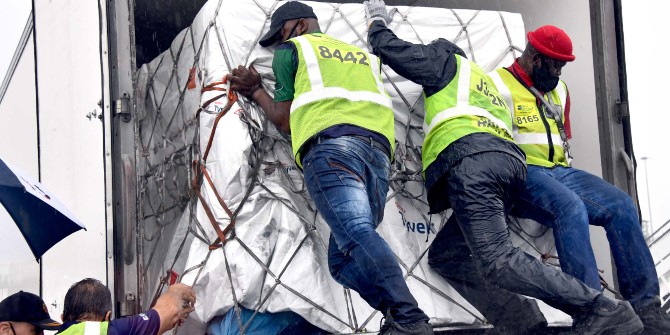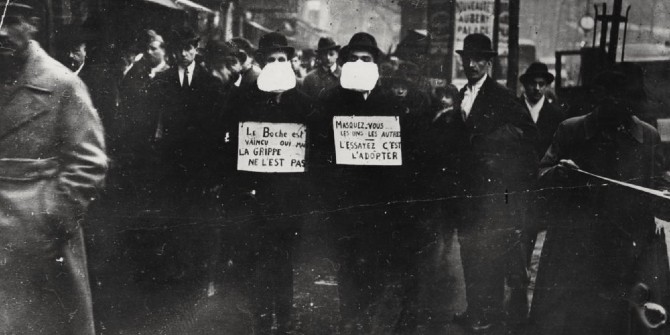Siva Thambisetty (LSE) reflects on the ongoing failure to increase countries’ access to COVID vaccines, especially through the TRIPS waiver proposal put forward in October 2020. She identifies emotion, dignity, and ideology as some of the key reasons why vaccine inequity continues.
‘It’s Christmas time, there’s no need to be afraid…’ And yet there is. The original 1984 lyrics of the Band Aid song directed at the famine in Ethiopia, also includes the line: ‘And the Christmas bells that ring there, are the clanging chimes of doom. Well tonight thank God it’s them instead of you’. I think of that original shocker now in the context of overcoming barriers to the global south getting vaccinated. It’s almost as if the current policy of the rich world is to say: thank God it’s them who are dying because they are not vaccinated, instead of you.
Most of 2021 I worked with four colleagues to make the legal and political case for a TRIPS waiver that would allow for the suspension of rules that protect intellectual property monopolies over the technology to manufacture COVID-19 vaccines. Such a waiver, if backed by government action, might then lead to greater freedom to operate for generic companies, which in time would increase production and supply of COVID vaccines and even productive competition amongst generic or follow-on innovators. Alas, more than a year since the proposal was first raised by India and South Africa, it remains moribund, opposed at the World Trade Organisation (WTO) by the EU, Norway, Canada and the UK. So far, it’s not happening.
Global solidarity now feels like a figment of the imagination
Meanwhile, high-income countries have stitched up the supply of vaccines. Omicron, which was arguably caused due to vaccine inequity, has allowed the Pfizers and the Modernas of this world to capture ever burgeoning markets with boosters and expansion to younger children. Meanwhile, the curve of rapid transmission grows. I fear for all the people I know who live in low- or middle-income countries who are not boostered yet – for instance my father in India, and my student in Uganda. I fear that many more children will be orphaned, and economic recovery pushed back even further. But above all I fear that the moral weight of right action and fellow-feeling will disappear in a fog of pledges, philanthropy, and profiteering. Global solidarity now feels like a larger than life figment of the imagination, and I doubt its existence.
The WHO now believes that we will not achieve 70% vaccination in Africa until the second half of 2024. Voluntary sharing of technology and licenses have not manifested at scale, even though arguments about capacity to manufacture these vaccines in developing countries have been refuted – we now have a list with 100+ such potential manufacturers. Meanwhile the EU has presented a counter proposal at the WTO that I and others believe is mostly performative and ignores the inadequacy of existing measures. The US, for all its celebrated support for a limited TRIPS waiver, has not helped produce a negotiating text at the WTO. G20 countries, including the UK, have wasted doses while ignoring pleas to use existing measures like the Canadian Access to Medicines regulation to allow production to supply lower and middle-income countries to begin under a compulsory license. Meanwhile vaccine manufacturers’ profits have soared while massive economic loss, a prolonged pandemic and further deaths in unvaccinated populations in low- and middle-income countries are inevitable.
What follows is my auto-ethnographic musings as a legal scholar at the coalface of the debate on the TRIPS waiver. I want to share what I now think of as different pathologies of responses. I believe that understanding these pathologies – and they do seem to me to be a kind of sickness – go to the very heart of why vaccine inequity endures. I want to address the hidden curriculum in these responses. What they are tacitly asking us to learn is a better understanding of the underlying role of emotions, dignity and ideology in the apparently rational debate. I cannot resolve these questions yet, but I raise them here so that we may get better at identifying obstacles for meaningful change.
Emotion
A senior colleague and former judge I admire referred to the TRIPS waiver proposal as an emotional response to a complex problem. Even Pfizer’s CEO accused the WHO director of speaking emotionally about the failings of vaccine manufactures. What is going on here?
To emote is human, yet there is a tendency amongst academic lawyers to posit ‘emotion’ as contrary to ‘rationality’, which suggests that affective reactions don’t involve information processing and reasoning, or that they are somehow epistemically inferior to them. This binary denies differences between moral intuitions (‘being emotional’) and moral reasoning. As many theorists including Antonio Damasio have illustrated, our automatic affect-laden processes give us evaluative feelings of good and bad, that appear in our consciousness without any awareness of having gone through steps of weighing evidence and inferring a conclusion.
Moral reasoning, on the other hand, entails processing of information about people and actions in order to reach a moral judgment or decision. In some cases, it can be a question of demonstrating the search and weighing up of evidence, and in other cases intuition and reasoning may both point in the same direction. Moral reasoning may also override moral intuition, and vice versa. To explore this terrain further takes us into moral psychology and meta-ethics. Or as one might say colloquially, just because one feels and is emotional does not mean one is not also thinking clearly. As someone who understands the terrain and cares about it deeply, I like many other experts think and feel the TRIPS waiver is a proportional response to a catastrophic problem.
Dignity
Not being able to look after your own needs and your people’s needs is ultimately humiliating. While charity in extremis has a place, a true benefactor thinks about dignity and treats others as they would want to be treated themselves. The demand for a TRIPS waiver is fundamentally about the dignity of striving to develop resilient systems to take care of one’s own needs, not to have to rely on fickle benefactors. When political leaders loudly proclaim the ‘success’ of Covax in egregiously upbeat terms, its hurtful and offensive in ways that are difficult to put in legal or policy terms. Many conversations about technology transfer and the TRIPS waiver miss this point entirely.
In June 2021 Canada had ten times the number of doses as citizens, and the UK five times
To illustrate, in June 2021 Canada had ten times the number of doses as citizens, and the UK five times. In the wake of such stockpiling, African countries have been handed vaccine doses in the last few weeks and months that are nearing expiry, presenting a massive challenge to administer – a mode that campaigner Fatima Hassan refers to as the a ‘drip, drip, drip, flood model’. Germany sent 2.5 million AstraZeneca doses in October to Nigeria that were due to expire in November, and Switzerland sent 105,000 with just a few days to expire. These are the leftovers from the plates of wealthy governments. It’s a far cry from Aristotle’s justification of property where the psychological value of property lies in enabling the owner to give it to others. These near-expiry vaccines have fuelled vaccine hesitancy amongst some populations, and Nigeria has recently said they will not accept such vaccines anymore.
Ideology
A third category of response has rested on what at times looks like blind ideological commitment to intellectual property (IP), which is itself a close cousin of the view that understanding it requires highly specialised formal training. Both the commitment to IP and the appeal to specialist technical knowledge are laced with a kind of normative foundationalism – something seen through rather than seen – such that a simple, yet profound humanitarian appeal to morality fails to make a dent.
This kind of blockage disempowers advocates with experiential expertise of the consequences of IP monopolies. For true believers, IP is predicated on the idea that legislation and international agreements capture via property rights, the optimal way to incentivise inventors, and that the system we currently have is the best we can devise. Such responders become in effect ‘caretakers’ of the system; they till a small technical field rather than imagine radical solutions to problems that are unprecedented in scale and type. And yet, maddeningly, it is surely incumbent on those who oppose the waiver to come up with a solution to the problem of undersupply. One year on, there does not seem to be a viable plan to increase production.

I find Jonathan Haidt’s work on authority revealing here. Responses that oppose the waiver originate from moral notions that are about more than just harm and fairness. The moral weight of these responses is not so much about how we view the suffering of other people but ‘about how to be part of a group, especially a group that is competing with other groups.’ In this respect it seems to matter that one of the defining features of legal systems like the UK, the US ,and even civil systems in EU member states, is respect for the ‘authority’ of property which transfers to the ‘idiotic fiction’ (in James Penner’s words) that IP constitutes property in ideas or expressions, rather than merely a class of rights to monopolies.
Legally and politically, there is no doubt in my mind that the TRIPS waiver, if put in place a year ago, would have helped drive production of existing vaccines, improvements in current technology, and helped prevent mutations like Omicron
Intellectual property enjoys extraordinary levels of deference because it rides on meritocracy and the attainment status of inventorship, even where it is really investment clad as creativity, or ignores collaboration and diminished risk or fortuitous circumstances. This appears to be the view of Health Secretary Sajid Javid when he said in parliament: ‘waiving IP and patents is not going to help as it removes all incentives from pharmaceutical companies to produce life saving drugs’. IP also benefits from respect for the authority of property that transcends just fear of reprisal for trespassing or theft. This, I believe, is at the core of the view expressed by Jens Spahn, German Federal Minister for health when he said ‘tech transfer is easier if done on a voluntary basis and enforcing cooperation is not very productive.’ The view pits property against regulation, which ‘enforces cooperation’ in society all the time. This kind of ideological deference is not benign. It actually militates against a simpler moral calculus based on fellow feeling or what Richard Rorty called the ‘progress of the sentiments’.
The TRIPS waiver has divided many intellectual property law academics – but the divide in opinions is telling us more than we bargained for because it speaks directly to what makes us human. There is no magical thinking that can help us resolve these issues. Legally and politically, there is no doubt in my mind that the TRIPS waiver, if put in place a year ago, would have helped drive production of existing vaccines, improvements in current technology, and helped prevent mutations like Omicron. Instead, we are stuck with fossilised versions of vaccine technology beholden to a small number of companies that view every new variant as an extractive market opportunity.
This post represents the views of the author and not those of the COVID-19 blog, nor LSE. It first appeared at LSE British Politics and Policy.





